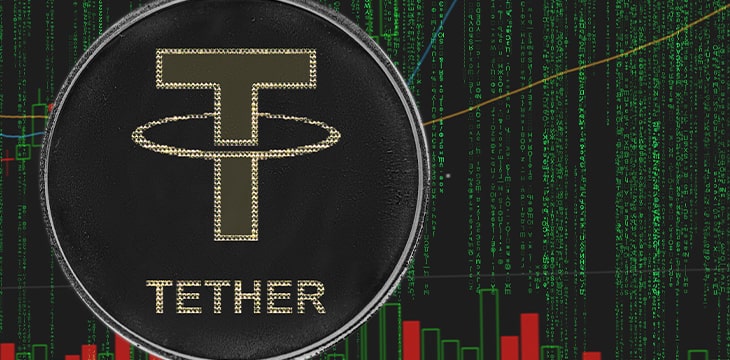
|
Getting your Trinity Audio player ready... |
An appellate division of the U.S. Supreme Court published an opinion on July 9, 2020, giving the New York State Attorney General approval to further investigate the Tether “stablecoin” and its web of corporate backers. The news generated more bad press for entrepreneur Brock Pierce, a Tether co-founder who announced recently he would launch an independent campaign for President of the United States based on his image as a businessman in the tech industry and as a blockchain advocate in particular.
Tether launched in 2014 as the first “stablecoin“, a blockchain digital asset designed to be less volatile in value than existing ones. The initial idea was that each Tether unit (USDT) would be backed by one dollar in existing USD reserves, and would be redeemable for the same. This (in theory) solved two problems: traders would have a more stable asset in which to “park” digital asset value in volatile times, and exchanges could more easily transfer USD value between themselves and customers.
The problem with Tether
Tether’s exact structure is complicated and its image has long been clouded by claims it isn’t backed by USD at all, and that fresh supplies of USDT are “minted” and sent to exchanges right before sudden BTC price rises. The asset itself (which may also represent EUR or JPY value) exists on multiple blockchain platforms as a native asset or token. Issuer Tether Holdings Limited shares a parent company (Digifinex Inc.) with iFinex, which owns the Bitfinex digital asset exchange. Tether Holdings includes the companies Tether Limited, Tether Operations Limited, and Tether International Limited.
New York’s investigation concerns the case James v. iFinex Ltd, which does not accuse anyone of wrongdoing, but seeks more information on the exact nature of Tether’s real asset reserves and its governance structure. USDT has a market cap of around US$9.8 billion, though Tether Limited’s lawyers said in 2019 only 74% of that was in actual U.S. dollar. No official audit has ever been released (despite being promised) and details of exactly what assets back the remaining value have been vague.
The published opinion does not accuse Tether or its associated companies of wrongdoing per se, though as respondents to the James v. iFinex Ltd. suit they had attempted to limit the authority of investigators to examine their operations. The appellate court’s statement overrules that attempt.
What does this have to do with Brock Pierce?
Pierce is not mentioned in the appellate court’s opinion, though he was a Tether co-founder, and is still listed on its website as an advisor. However, in a recent interview with Bloomberg, he said he hadn’t been involved with Tether since 2015 and described it as “one of the most important innovations in currency, but it also seemed like one of the higher risk businesses.”
Pierce, a former child actor, is one of the digital asset industry’s most well-known names and faces, as well as one of its most public advocates. His name appears in association with numerous projects, often causing problems for both Pierce and the projects in question.
Pierce is the current chairman of the Bitcoin Foundation, where he is described as a “founder, advisor, board member of GoCoin, Tether, ZenBox, Blade Financial, Expresscoin, Noble Markets, BitGo, ChangeTip, BlockStreet, Coin Congress, and Plug and Play.” He was also a co-founder of Block.one, which grew out of Pierce’s company Blockchain Capital and produced the EOS blockchain project and asset.
A few days ago, EOS dropped out of the top 10 list (by market cap) on digital asset data aggregator sites, losing its place to Binance Coin (which itself had fallen several places in the past month). A smart contract platform, EOS has faced similar problems to that of Ethereum—including underwhelming development activity and accusations that it cannot scale to the levels required to see mass usage.
Block.one disassociated itself from Pierce in a “mutual agreement” in March 2018 following a TV segment in which comedian John Oliver skewered the digital asset industry, singling out Pierce in particular. Oliver had referred to a past scandal involving Pierce and asked his audience to Google it.
In 2000, then 20-year-old Pierce had faced lawsuits from three former employees of his 1990s tech startup Digital Entertainment Network (DEN). Pierce has publicly denied the allegations made in one of the lawsuits, describing them as “part of an extortion scheme.” He eventually paid US$21,000 to settle one suit, and the remaining two were dropped.
That was still too much for Block.one, which stated “we are conscious of the importance of robust corporate communications. We take professional standards seriously and are always focused on raising the bar as our company transitions from startup to aggressive growth.” In interviews months after Block.one’s statement, Pierce described himself as still a supporter of EOS and its ecosystem.
Associations between Pierce and his many associated projects—whatever past or current connections, and whether any accusations against him or the projects are true or untrue—will only continue to air publicly as he ramps up his new presidential campaign.
Attention can have both negative and positive effects. The Bitcoin industry has faced its own legal hassles, though in recent weeks court depositions have served mainly to give the public a chance to hear more detailed evidence of its history, and discredit media rumors. It has also drawn more attention to the nature and purpose of Bitcoin (as it now exists, as BSV). As a result, more people now have a much better idea of who created Bitcoin, and that it was intended to be a secure—and auditable—blockchain ledger capable of handling digital payments and processing massive amounts of data.
Recommended for you
Lorem ipsum odor amet, consectetuer adipiscing elit. Elit torquent maximus natoque viverra cursus maximus felis. Auctor commodo aliquet himenaeos fermentum
Lorem ipsum odor amet, consectetuer adipiscing elit. Accumsan mi at at semper libero pretium justo. Dictum parturient conubia turpis interdum

 11-22-2024
11-22-2024


